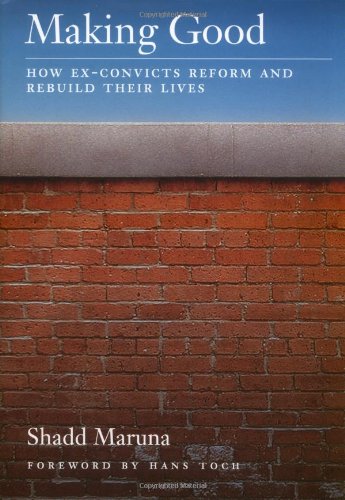
Sinopsis
Can hardened criminals really reform? ""Making Good"" provides resounding proof that the answer is yes. This book provides a fascinating narrative analysis of the lives of repeat offenders who, by all statistical measures, should have continued on the criminal path but instead have created lives of productivity and purpose. This examination of the phenomenology of ""making good"" includes an encyclopedic review of the literature on personal reform as well as a practical guide to the use of narratives in offender counseling and rehabilitation.The author's research shows that criminals who desist from crime have constructed powerful narratives that aided them in making sense of their pasts, finding fulfillment in productive behaviors, and feeling in control of their future. Borrowing from the field of narrative psychology, Maruna argues that to truly understand offenders, we must understand the stories that they tell - and that in turn this story-making process has the capacity to transform lives. ""Making Good"" challenges some of the cherished assumptions of various therapy models for offenders and supports new paradigms for offender rehabilitation. This groundbreaking book is a must read for criminologists, forensic psychologists, lawyers, rehabilitation counselors, or anyone interested in the generative process of change.
"Sinopsis" puede pertenecer a otra edición de este libro.
Reseña del editor
Can hardened criminals really reform? ""Making Good"" provides resounding proof that the answer is yes. This book provides a fascinating narrative analysis of the lives of repeat offenders who, by all statistical measures, should have continued on the criminal path but instead have created lives of productivity and purpose. This examination of the phenomenology of ""making good"" includes an encyclopedic review of the literature on personal reform as well as a practical guide to the use of narratives in offender counseling and rehabilitation.The author's research shows that criminals who desist from crime have constructed powerful narratives that aided them in making sense of their pasts, finding fulfillment in productive behaviors, and feeling in control of their future. Borrowing from the field of narrative psychology, Maruna argues that to truly understand offenders, we must understand the stories that they tell - and that in turn this story-making process has the capacity to transform lives. ""Making Good"" challenges some of the cherished assumptions of various therapy models for offenders and supports new paradigms for offender rehabilitation. This groundbreaking book is a must read for criminologists, forensic psychologists, lawyers, rehabilitation counselors, or anyone interested in the generative process of change.
Reseña del editor
Can hardened criminals really reform? This text offers proof that the answer is yes. It provides a narrative analysis of the lives of repeat offenders who, by all statistical measures, should have continued on the criminal path but instead have created lives of productivity and purpose.
"Sobre este título" puede pertenecer a otra edición de este libro.
Otras ediciones populares con el mismo título
Resultados de la búsqueda para Making Good: How Ex-Convicts Reform and Rebuild Their...
Making Good: How Ex-Convicts Reform and Rebuild Their Lives
Librería: HPB-Red, Dallas, TX, Estados Unidos de America
Hardcover. Condición: Good. Connecting readers with great books since 1972! Used textbooks may not include companion materials such as access codes, etc. May have some wear or writing/highlighting. We ship orders daily and Customer Service is our top priority! Nº de ref. del artículo: S_448272988
Comprar usado
Cantidad disponible: 1 disponibles
Making Good: How Ex-Convicts Reform and Rebuild Their Lives
Librería: BennettBooksLtd, San Diego, NV, Estados Unidos de America
hardcover. Condición: New. In shrink wrap. Looks like an interesting title! Nº de ref. del artículo: Q-1557987319
Comprar nuevo
Cantidad disponible: 1 disponibles

